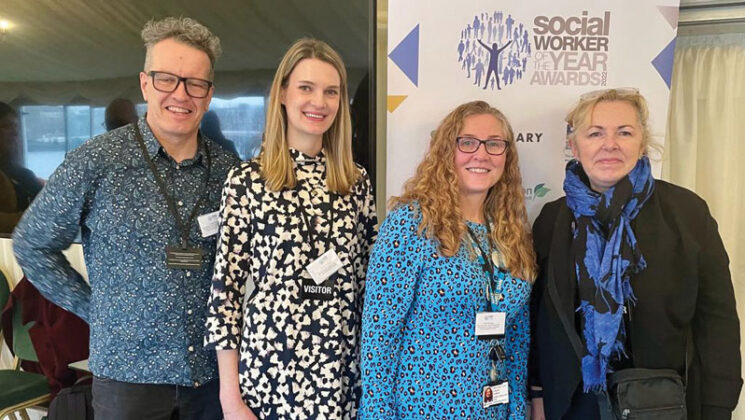UNISON member Lynette Kennedy has been a nurse for 27 years, specialising in supporting people with learning disabilities. Last year, her team at Camden Integrated Learning Disability Service won the Social Work Team of the Year award at the 2022 Social Worker of the Year Awards.
The award was presented in honour of the team’s efforts over six years to release an autistic woman, Kasibba, from a mental health hospital where she had been inappropriately detained all her adult life. Lynette says this wouldn’t have been possible without the team’s integrated, multidisciplinary approach.
Integrated working
An integrated team is one where health professionals and social workers collaborate closely together in order to make the best decisions for service users. The team around Kasibba was a combination of employees from London Borough of Camden and Camden and Islington NHS trust.
“We worked together”, says Lynette (pictured above, second from right, with her team). “All the reports say that health and social care need to be more aligned, because it’s very difficult to plan care for someone when a team isn’t integrated. Usually you share the same values, but don’t always share joint procedures and work to different sets of standards.”
Kasibba, who is non-verbal, entered the care system as a child, and had been detained in an institution for her whole adult life until Lynette and her team intervened in 2017. Lynette explains that Kasibba’s autism made living with other people difficult: “She’s unable to put things in place to make herself more comfortable, and the only ways for her to get attention are to behave in a manner that’s socially unacceptable.”
Lynette attributes the decision to detain Kasibba for her entire adult life to systemic racism, referencing shocking care reports from 1980 which described Kasibba, a Black woman, as ‘savage’.
“When she was in the hospital, she was the only Black woman there. There used to be a support worker who would spend a long time braiding her hair, but when that social worker left, they cut her hair really short so it was easier for them to manage. They never asked her what she wanted.
“People living in institutions have very little touch, and having her hair done was one of the only ways she could have physical contact. To lose that part of your identity and to lose that connection to someone doing your hair, is awful.”
At first, the hospital staff were resistant to criticism, and Lynette describes how a lot of trust-building work had to be done. “We had to all be on board with the end goal of moving Kasibba out. We weren’t going to achieve that if we were adversarial. Releasing someone involves the Court of Protection, and we would never have been able to get there if we didn’t have the inpatient team on board.”
Listening to the service user
Lynette and her team met with the inpatient team every three weeks and gradually put steps in motion to support Kasibba’s transition to live independently, using a process called ‘graded exposure’.
“We would go for a drive, and drive past the bungalow we’d found for her to live in, and take a picture with her. We’d explain that it was going to be her home, and we’d go inside, have a snack and do a jigsaw puzzle.
“We then introduced staff who would be working with her there – a year and a half before she moved in. We prepared her as much as possible, and she did amazingly. We had to figure out how to move at her pace and keep listening to her.”
In August 2022, a judge agreed that Kasibba could finally move to her own home.
Lynette says: “It’s amazing, and her resilience is astounding. She was seen as someone who would never move out of the hospital but, after 47 years, she has. This is the first time in her life she hasn’t been held behind locked doors, and it’s taken her just three weeks to adjust.
“We knew that her life would be so much better out of the hospital, and we were determined to make it happen. I work in the community with people who exhibit far more challenging behaviour who are not under the restrictions she was under. She was a victim of racism.”
Under-funding of social care
Lynette acknowledges that integrated working and the amount of time the team had to devote to Kasibba was essential. “It was only possible because the team was supported by managers. If we had a bigger caseload, we couldn’t have done this. It was always about the long game and Kasibba’s quality of life.”
Lynette wants to see a more integrated team working across social services, but recognises there are financial limitations to this. “They’re not cost-saving. That’s an issue. Money is a barrier even though it shouldn’t be”.
She describes the government’s under-funding of social care as “robbing Peter to pay Paul. The people who should be supported by social care end up in the health system anyway.”
Kasibba has now been living in her home for 10 months. “Her support worker told me recently that she loves going out into her garden,” Lynette says. “She gets so much joy from being in her own home and being able to just go into the garden when she feels like it, rather than waiting for a member of staff to be free to take her.”
UNISON is a regular sponsor of the Social Workers of the Year award, seeing it as an opportunity to pay tribute to the great teamwork and high-quality professionalism at the heart of public service and social work.
On presenting the award to Lynette and her team, UNISON national secretary for local government Mike Short said: “UNISON is very happy to be involved in this year’s Social Worker of the Year Awards and to be presenting the Team of the Year, Adult Services Award.
“Social workers do vital work in supporting and protecting individuals and communities. We are really pleased that through these awards they are receiving some well-deserved recognition for the work they’ve done.
“As the UK’s largest trade union for social workers and the wider social care workforce, we know the challenges social workers face and the differences they make to people’s lives. And as an organisation built on solidarity and togetherness, UNISON would like to pay tribute to the social work teams that practise effective team working on a daily basis.”
Campaigning nationally
UNISON campaigns nationally to protect and improve social workers’ pay, terms and conditions and job security.
Mr Short continued: “We also applaud the social workers across the country who are taking a stand through UNISON against the wider challenges facing the profession, like continued austerity, rising demand for services and growing caseloads.
“The fight for better pay, working conditions and genuine development opportunities will result in better services for the public.”
UNISON’s social work manifesto
UNISON’s social work manifesto sets out a plan for developing social work by:
- improving working conditions for social workers;
- promoting a positive image of social work and social workers;
- investing in social worker development;
- ending austerity and rebuilding public services;
- ending privatisation of health and social care.
Nominations for the 2023 Social Worker of the Year awards have now closed. The ceremony will be held in November. You can find out more at www.socialworkawards.com





